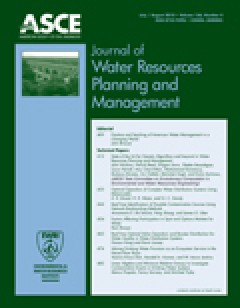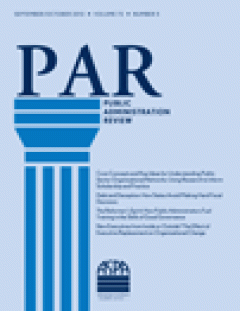Filter by

Multiobjective Allocation of Transboundary Water Resources: Case of the Euphr…
The allocation of water in a multicountry river system necessarily involves conflicting objectives, where increasing water benefits for one country entails losses for other countries. This paper presents the formulation and application of a multiobjective linear programming model, where each objective represents the benefits for a country from using water for agriculture, urban consumption, and…
- Edition
- Volume 136, Issue 1, January/February 2010. pp. 95
- ISBN/ISSN
- 07339496
- Collation
- -
- Series Title
- Journal of Water Resources Planning and Management
- Call Number
- -

Valuation of Flood Reductions in the Yellow River Basin under Land Use Change
An economic valuation of flood reductions arising from land use changes induced by the Conversion of Cropland to Forest and Grassland Program (CCFGP) in China is detailed in this paper. A distributed hydrologic model is used to analyze and predict changes in the probability of flood occurrences in the Yellow River Basin (YRB) due to revegetation activities under the CCFGP. The expected value of…
- Edition
- Volume 136, Issue 1, January/February 2010.pp. 106
- ISBN/ISSN
- 07339496
- Collation
- -
- Series Title
- Journal of Water Resources Planning and Management
- Call Number
- -

Pressure-Dependent Leak Detection Model and Its Application to a District Wat…
Cost-effective reduction of water loss is a compelling but challenging task for water utilities. This paper presents a model-based optimization method for leakage detection of water distribution systems. Leakage hotspots are assumed to exist at the model nodes identified. Leakage is represented as pressure-dependent demand simulated as emitter flows at selected model nodes. The leakage detectio…
- Edition
- Volume 136, Issue 1, January/February 2010. pp. 11
- ISBN/ISSN
- 07339496
- Collation
- -
- Series Title
- Journal of Water Resources Planning and Management
- Call Number
- -

Gossip in Organizations: Contexts, Consequences, and Controversies
This article examines the key themes surrounding gossip including its contexts, the various outcomes (positive and negative) of gossip, as well as a selection of challenges and controversies. The challenges that are highlighted revolve around definitional issues, methodological approaches, and ethical considerations. The authors� analysis suggests that the characteristics and features of gossip…
- Edition
- Vol. 35 no. 4 August 2010.pp. 371-390
- ISBN/ISSN
- 10596011
- Collation
- -
- Series Title
- Group Organization Management
- Call Number
- -

Cross-Cultural Generalizability of Paternalistic Leadership: An Expansion of …
Paternalism is an emerging concept with significant potential for international leadership research. Paternalistic leaders combine benevolence with authority. Paternalism is a prevalent leadership style in non-Western business organizations. In this article, the authors extend research on paternalism to the Western business context. They compare the attitudes of employees from the United States…
- Edition
- Vol. 35 no. 4 August 2010.pp. 391-420
- ISBN/ISSN
- 10596011
- Collation
- -
- Series Title
- Group Organization Management
- Call Number
- -

Emotional Intelligence and Trust in Formal Mentoring Programs
This study examined the roles of mentors� and prot�g�s� emotional intelligence and prot�g�s� trust in the mentors in formal mentoring relationships. Using reports from both mentors and prot�g�s in 147 formal mentoring dyads, results of partial least squares analysis indicated that mentors� emotional intelligence directly and indirectly related to mentoring provided through prot�g�s� trust in th…
- Edition
- Vol. 35 no. 4 August 2010.pp. 421-455
- ISBN/ISSN
- 10596011
- Collation
- -
- Series Title
- Group Organization Management
- Call Number
- -

The Mediating Role of Appraisal Feedback Reactions on the Relationship Betwee…
Although feedback is advocated as a means for influencing performance, empirical investigations indicate that the effect of feedback on performance is not uniformly positive. In the proposed model, reactions to feedback, not feedback per se, influence performance. In response to the lack of research on causal mechanisms linking feedback to performance and calls for such research, reactions are …
- Edition
- Vol. 35 no. 4 August 2010.pp. 494-526
- ISBN/ISSN
- 10596011
- Collation
- -
- Series Title
- Group Organization Management
- Call Number
- -

Organizational Cultural Intelligence: Dynamic Capability Perspective
This study introduces the conceptual foundations of cultural intelligence (CQ) at the organizational level and elaborates on its three factors: process, position, and path capability. Drawing on Early and Ang�s individual level of CQ conceptualization and Teece et al.�s dynamic capability framework, the proposed organizational CQ theory suggests how micro theories of cultural intelligence can b…
- Edition
- Vol. 35 no. 4 August 2010.pp. 456-493
- ISBN/ISSN
- 10596011
- Collation
- -
- Series Title
- Group Organization Management
- Call Number
- -

Editorial: Steps towards the Renovation of Acculturation Research Paradigms: …
Acculturation refers to cultural learning and adjustment in the context of continuous cross-cultural experience. Plato, in his �Laws�, considered cross-cultural imitation to be a risk arising from foreign commerce. In the 19th century, European theorists wrote of the amalgamation processes by which diverse peoples were culturally unified for the purposes of the nation-state. In the 20th century…
- Edition
- Vol. 16 no. 3 September 2010. pp. 299-312
- ISBN/ISSN
- 1354067x
- Collation
- -
- Series Title
- Culture Psychology
- Call Number
- -

Phenomenology of Acculturation: Retrospective Reports from the Philippines, J…
Acculturation refers to cultural learning and adjustment in the context of continuous cross-cultural experience. A phenomenology based on retrospective descriptions and analyses of self-observations in acculturation contexts may contribute to the development of theory, constructs, models, and innovative interventions. This phenomenology report focuses on 1) super-ordinate decisions, e.g., to ea…
- Edition
- Vol. 16 no. 3 September 2010. pp. 313-332
- ISBN/ISSN
- 1354067x
- Collation
- -
- Series Title
- Culture Psychology
- Call Number
- -

Acculturation Experiences in Korea and Japan
This article provides new insights into the study of acculturation based on a phenomenological research design, that is, in-depth and conscious descriptions and reflections. The in-depth descriptions illustrate the plurality and complexities inherent in the social networks and languages of highly skilled migrants in foreign countries, which transcend the customary local�foreign dichotomy. In Ko…
- Edition
- Vol. 16 no. 3 September 2010 .pp. 333-348
- ISBN/ISSN
- 1354067x
- Collation
- -
- Series Title
- Culture Psychology
- Call Number
- -

Found in Transition: An Acculturation Narrative of Immigration from the Forme…
This article presents a personal narrative exemplifying acculturation processes and their theoretical analysis. The author describes the development of his Jewish identity in the Soviet Union, emigration, and adjustment to Israel. The author�s affiliations with his ethnic group, the country of origin, and the country of immigration are described and analyzed as an ever-changing process. The rol…
- Edition
- Vol. 16 no. 3 September 2010.pp. 349-363
- ISBN/ISSN
- 1354067x
- Collation
- -
- Series Title
- Culture Psychology
- Call Number
- -

Self-Development and Relationships through Acculturation
The present paper sheds some light on difficulties experienced by Asian immigrant adolescents in North America while undergoing self-development and social relationships within the larger stream of acculturation processes. Given the strong emphasis placed by their original culture on collectivity and hierarchical harmony within the family, and given the family�s evolving lifestyle as new immigr…
- Edition
- Vol. 16 no. 3 September 2010.pp. 365-381
- ISBN/ISSN
- 1354067x
- Collation
- -
- Series Title
- Culture Psychology
- Call Number
- -

Commentary: Liminality in Acculturation and Pilgrimage: When Movement Becomes…
Movement entails both local/short-term and distant/long-term journeys to unfamiliar lands. Psychology has traditionally neglected human-beings-on-the-move to concentrate on fixed structures. Overcoming this oversight, acculturation studies shed light on human beings crossing boundaries, and the authors of these articles bring up the positive side of acculturation (without leaving out the ambiva…
- Edition
- Vol. 16 no. 3 September 2010. pp. 383-393
- ISBN/ISSN
- 1354067x
- Collation
- -
- Series Title
- Culture Psychology
- Call Number
- -

Drawing on the Notion of Symbolic Resources in Exploring the Development of C…
This paper examines the processes by which cultural identities develop through the use of symbolic resources (Zittoun, 2006). The notion of symbolic resources provides a framework that enables one to consider developmental transitions between practices and between historical times. For Portuguese students, these transitions initially involved a rupture, a loss of social resources and linguistic…
- Edition
- Vol. 16 no. 3 September 2010.pp. 395-415
- ISBN/ISSN
- 1354067x
- Collation
- -
- Series Title
- Culture Psychology
- Call Number
- -

Constructing Identity as a Second-Generation Cypriot Turkish in Australia: Th…
This article explores how Cypriot Turkish people in Australia construct their multi-hyphenated identity and the implications this has for their sense of belonging. Ethnic identity is conceptualized as a set of social and cultural understandings, shaped by historical processes, positions of power and patterns of privilege, which people draw on to understand and experience themselves. Ten Cypriot…
- Edition
- Vol. 16 no. 3 September 2010.pp. 416-436
- ISBN/ISSN
- 1354067x
- Collation
- -
- Series Title
- Culture Psychology
- Call Number
- -

Commentary: Making Sense of Immigrant Identity Dialogues
This commentary builds on the contributions of Ali and Sonn (2010), Hale and Abreu (2010) and on the growing literature in the field to extend the discussion on the development of identity for immigrant and ethnic populations. I draw attention to the aspects of both social contexts�country of origin and country of residence�and the ways they shape identity for the populations in question. I exa…
- Edition
- Vol. 16 no. 3 September 2010.pp. 437-448
- ISBN/ISSN
- 1354067x
- Collation
- -
- Series Title
- Culture Psychology
- Call Number
- -

Retrospectives and Prospectives on Hurricane Katrina: Five Years and Counting
New Orleans� recovery from the damage caused by Hurricane Katrina in 2005 reflects a long, complex, contentious process that still is not complete. In this article, the authors explore the key factors that have supported and hindered recovery so far. Initial conditions within the city, the web of policy demands, as well as recent changes in law and procedures for the region are explored using a…
- Edition
- Volume 70, Issue 5, September/October 2010, pages
- ISBN/ISSN
- 00333352
- Collation
- -
- Series Title
- Public Administration Review
- Call Number
- -

Unanswered Questions about Public Service Motivation: Designing Research to A…
As public service motivation research gains momentum, important questions emerge regarding its origins and consequences that are not addressed by existing research. The authors identify some fundamental public service motivation assumptions, including critical gaps in our current understanding of its basic tenets. The authors then discuss specific research studies that, by virtue of their findi…
- Edition
- Volume 70, Issue 5, September/October 2010. pages
- ISBN/ISSN
- 00333352
- Collation
- -
- Series Title
- Public Administration Review
- Call Number
- -

A Strategy for Building Public Service Motivation Research Internationally
As public service motivation research grows qualitatively and quantitatively, some scholars question its appropriateness for international applications. This essay sets out a strategy of convergence for international research and measurement approaches. Studies that assess commonalities in public service motivation content internationally are analyzed in order to develop a broader conceptual an…
- Edition
- Volume 70, Issue 5, September/October 2010. pages
- ISBN/ISSN
- 00333352
- Collation
- -
- Series Title
- Public Administration Review
- Call Number
- -
 Computer Science, Information & General Works
Computer Science, Information & General Works  Philosophy & Psychology
Philosophy & Psychology  Religion
Religion  Social Sciences
Social Sciences  Language
Language  Pure Science
Pure Science  Applied Sciences
Applied Sciences  Art & Recreation
Art & Recreation  Literature
Literature  History & Geography
History & Geography